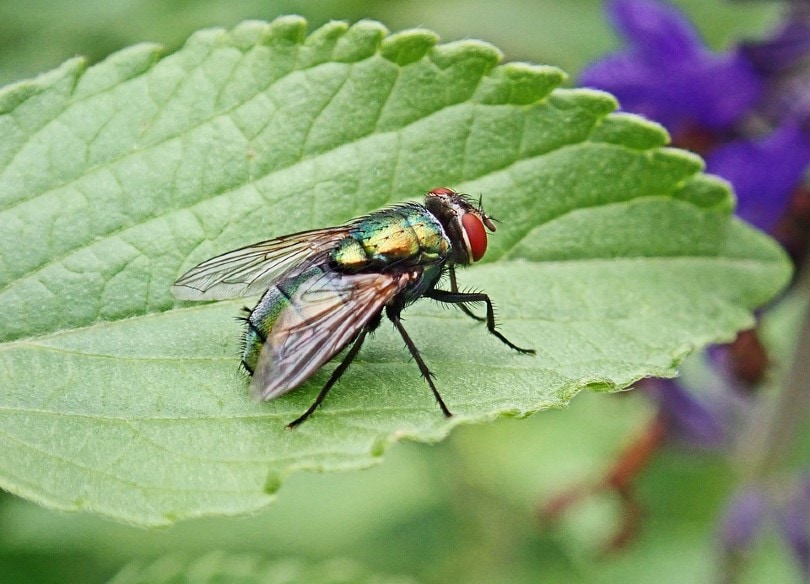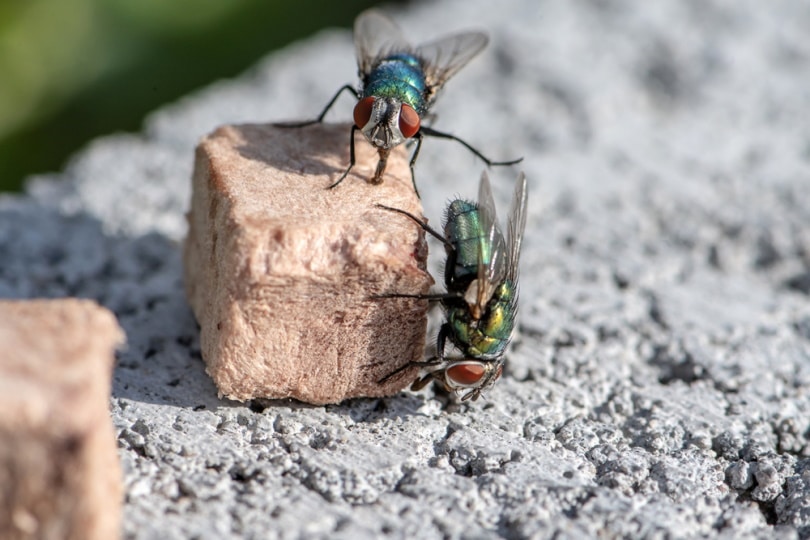
There’s usually no need to worry about your cat eating a fly. It’s perfectly normal behavior and generally won’t harm your cat. That being said, some cats have a more sensitive stomach than others and flies can carry both bacteria and parasites. Always contact your vet if you have any concerns about your cat’s health after eating flies.
Read on to find out why cats like to eat flies, ways to prevent the behavior and signs to look out for.
Why Do Cats Eat Flies?
It’s simple, really. Cats are hunters and enjoy any creature that scatters quickly and sporadically. Because of their hunting abilities, cats have unique ways of finding food whether inside or outside.
House cats are less likely to hunt out of hunger. Rather, they hunt because it’s what cats do, and flies are a welcomed opponent.
Insects Can Be Beneficial to Cats (Sometimes)
Insects, in general, make up a small percentage of a cat’s diet, particularly cats that live outside. Insects are commonly consumed by feral cats around the world and have been shown to contribute to up to 6% of their diet. You can bet that flies are amongst that percentage. In fact some pet foods use insects as a palatable and sustainable protein source .
Although insects can be more than just a hunting experience for cats, we’re not suggesting that your cat will obtain their nutritional requirements from eating flies, rather that they can digest a variety of insects including flies. However due to the disease risks, you still need to be careful.

Why Flies Aren’t Beneficial
Although eating the odd fly is unlikely to cause disease in an otherwise healthy cat, house flies can carry and transmit more than 100 human and animal diseases as well as parasites, including roundworms and tapeworms. There is a potential risk of these being passed on to your cat when they eat flies. There is also a risk from insecticides if the fly is contaminated with them, from the use of a fly spray for example.
If your cat is particularly partial to hunting and eating flies it can increase their risk of catching a disease so it’s advisable to take steps to reduce their exposure to flies. Consider fly traps or screens and make sure your kitty has lots of interactive toys to play with in the house so they are less likely to go on a fly hunt! In addition, be sure your cat is up to date with their worming treatments.
In this post, we’re talking about the common house fly. But there are horse flies, deer flies, bot flies, sand flies, and several more that can pass parasites, viruses, and diseases onto your cat. Contact your veterinarian about the most common parasites in your area and what you can do to keep your cat safe.
Which Insects Are Toxic to Cats?
More often than not, if your cat eats a bug, they’re probably going to be fine. Bug bites can sometimes be more concerning than your cat munching on one. Your cat can either have a reaction or develop an infection if the bite is left untreated.
Wasps, bees, fire ants, poisonous caterpillars, and brown recluses are all harmful. Keep your cat away from these insects and arachnids as best as you can. If you know your cat has been bitten or stung, or they are showing any concerning signs then take them to your vet as soon as possible.

Conclusion
Some insects are dangerous to cats, but ingesting the occasional house fly is generally not a cause for immediate concern. Flies can carry diseases and parasites though, so it is best to take measures to reduce your cat’s exposure to them. If your cat keeps eating flies it may increase their risk of catching a disease.
Keep an eye on your kitty and call your vet if you notice anything unusual or concerning.
See also:
- What Kinds of Bones Can Dogs Eat? 3 Vet-Approved Options
- Why Do Cats Get the Zoomies After They Poop? 5 Vet-Reviewed Reasons
Featured Image Credit: Buntysmum, Pixabay







